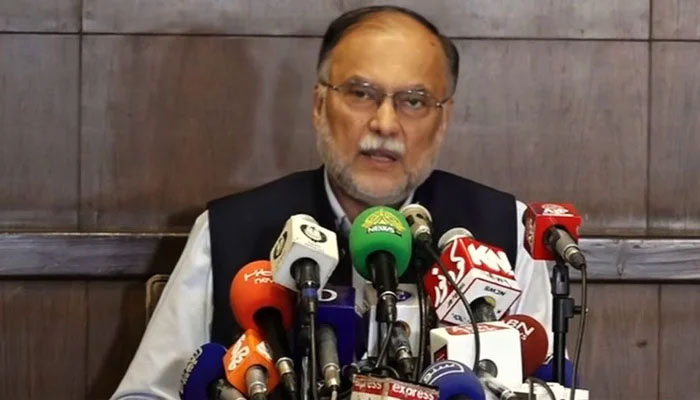Diplomatic fact check
Political fights, propaganda, a bit of exaggeration – this is all part and parcel of politics. But misstatements or false attributions that tend to affect a country’s diplomacy are a territory that should ideally be avoided. It is in this context that Federal Minister for Planning Ahsan Iqbal has accused “a political party” of spreading misinformation about Pakistan-China relations over the past few days, claiming that a smear campaign is underway to sabotage ties between the two friendly countries. The planning minister’s comments came after reports surfaced that Beijing had downgraded its relations with Islamabad, something Iqbal has termed as enemy propaganda. Pakistan and China have a strong multifaceted and multi-dimensional relationship. The China-Pakistan Economic Corridor (CPEC) is a project that both sides have invested in heavily and are committed to complete. CPEC’s stated aim is socio-economic development, employment opportunities and improvement in livelihoods in Pakistan.
To be fair, recent reports about Beijing downgrading relations would hardly pass the test of journalism, with experts pointing out that such reports are published in the international media due to two lense that converge: the West and India. Both have the same anti-China agenda. When such reports are read objectively and carefully, they are almost always without meat. It must also be understood that this is hardly the first time such reports have surfaced. The only difference is the attention they now receive at the domestic level. There is a rather bizarre trend by a specific political group to gleefully wave around anything that makes it seem like the Pakistani state or government are failing in their job. This is understandable only to an extent – after which it moves into a very toxic category.
Political parties should realize that not everything is about settling political scores, especially when it comes to propaganda pieces that are obviously just that. Unfortunately, the lines of political criticism have been blurred to such an extent now that some people think it’s kosher to use whatever comes their way. In a region where India wants to build its hegemony and China is its biggest challenger and in a world where the West sees China as a strong competitor because of the strong Chinese economy, both India and the West regularly dish out propaganda. At the heart of the issue lies the balance between political discourse and national interest. While political differences are inevitable in any democratic society, they must not be allowed to undermine fundamental national interests. The partnership between Pakistan and China spans various domains, including economic development through CPEC and advancements in the space sector. Any attempt to sabotage these initiatives is not just detrimental to bilateral relations but also undermines Pakistan’s economic and developmental prospects. It is imperative for all political parties to uphold national interests above partisan gains. Moving forward, a concerted effort is needed to foster a national consensus on foreign policy matters. This includes respectful dialogue within parliament and constructive engagement with state institutions. Pakistan’s ability to navigate global challenges depends on a united front, where national interest remains paramount.
-
 Extreme Cold Warning Issued As Blizzard Hits Southern Ontario Including Toronto
Extreme Cold Warning Issued As Blizzard Hits Southern Ontario Including Toronto -
 Lana Del Rey Announces New Single Co-written With Husband Jeremy Dufrene
Lana Del Rey Announces New Single Co-written With Husband Jeremy Dufrene -
 Ukraine-Russia Talks Heat Up As Zelenskyy Warns Of US Pressure Before Elections
Ukraine-Russia Talks Heat Up As Zelenskyy Warns Of US Pressure Before Elections -
 Lil Nas X Spotted Buying Used Refrigerator After Backlash Over Nude Public Meltdown
Lil Nas X Spotted Buying Used Refrigerator After Backlash Over Nude Public Meltdown -
 Caleb McLaughlin Shares His Resume For This Major Role
Caleb McLaughlin Shares His Resume For This Major Role -
 King Charles Carries With ‘dignity’ As Andrew Lets Down
King Charles Carries With ‘dignity’ As Andrew Lets Down -
 Brooklyn Beckham Covers Up More Tattoos Linked To His Family Amid Rift
Brooklyn Beckham Covers Up More Tattoos Linked To His Family Amid Rift -
 Shamed Andrew Agreed To ‘go Quietly’ If King Protects Daughters
Shamed Andrew Agreed To ‘go Quietly’ If King Protects Daughters -
 Candace Cameron Bure Says She’s Supporting Lori Loughlin After Separation From Mossimo Giannulli
Candace Cameron Bure Says She’s Supporting Lori Loughlin After Separation From Mossimo Giannulli -
 Princess Beatrice, Eugenie Are ‘not Innocent’ In Epstein Drama
Princess Beatrice, Eugenie Are ‘not Innocent’ In Epstein Drama -
 Reese Witherspoon Goes 'boss' Mode On 'Legally Blonde' Prequel
Reese Witherspoon Goes 'boss' Mode On 'Legally Blonde' Prequel -
 Chris Hemsworth And Elsa Pataky Open Up About Raising Their Three Children In Australia
Chris Hemsworth And Elsa Pataky Open Up About Raising Their Three Children In Australia -
 Record Set Straight On King Charles’ Reason For Financially Supporting Andrew And Not Harry
Record Set Straight On King Charles’ Reason For Financially Supporting Andrew And Not Harry -
 Michael Douglas Breaks Silence On Jack Nicholson's Constant Teasing
Michael Douglas Breaks Silence On Jack Nicholson's Constant Teasing -
 How Prince Edward Was ‘bullied’ By Brother Andrew Mountbatten Windsor
How Prince Edward Was ‘bullied’ By Brother Andrew Mountbatten Windsor -
 'Kryptonite' Singer Brad Arnold Loses Battle With Cancer
'Kryptonite' Singer Brad Arnold Loses Battle With Cancer




